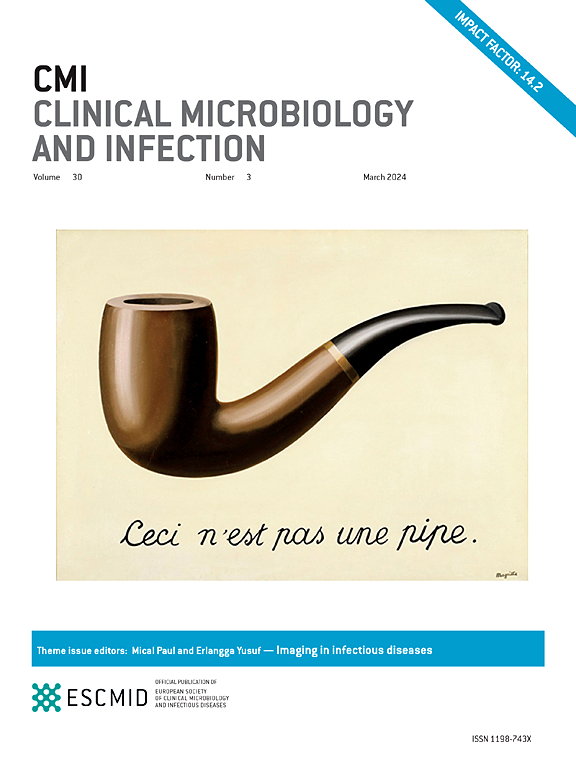ORCHESTRA Delphi consensus: diagnostic and therapeutic management of SARS-CoV-2 infection in solid organ transplant recipients
IF 8.5
1区 医学
Q1 INFECTIOUS DISEASES
引用次数: 0
Abstract
Objectives
We aimed to address existing knowledge gaps regarding risk stratification, best use of diagnostic resources, optimal treatment, and general management of SARS-CoV-2 infection in solid organ transplant (SOT) recipients. As high-quality evidence specific to this fragile population is lacking, our final aim was to provide an expert consensus evidence-informed guidance that can aid clinicians in their daily practice.
Methods
This study was conducted within the Working Package 4 (fragile population cohorts) of the H2020-funded ORCHESTRA study (https://orchestra-cohort.eu). Eight infectious disease and one clinical pharmacology specialists conducted a comprehensive scoping literature review which covered five key areas: the role of SOT as a risk factor for evolution to severe disease; the optimal use of diagnostic resources, considering cost–benefit ratios and appropriateness of active screening; population-specific therapeutic management, including antiviral use and drug–drug interactions and appropriate duration of treatment; the potential need for withdrawal of immunosuppressive agents and management of potential donors and recipients with recent and/or ongoing SARS-CoV-2 infection at the time of transplantation. On the basis of this review, a 28-item questionnaire was developed and administered to a panel of experts through two rounds, following the Delphi methodology.
Results
The panel consisted of 21 experts, 13 females and 8 males, from Italy (n = 11), Spain (n = 5), Switzerland (n = 2), Brazil (n = 1), United States (n = 1), and United Kingdom (n = 1). Consensus was achieved for 18 out of 28 items after the first round and for 9 out of 13 items after the second round, according to agreement/disagreement levels obtained for each question and round, ten statements were finally produced.
Discussion
The consensus statements derived from this study offer a framework for standardizing care and improving outcomes in SOT recipients affected by SARS-CoV-2 infection in a field where high-quality evidence specific to this high-risk population is currently lacking.
实体器官移植受者SARS-CoV-2感染的诊断和治疗管理。
目的:我们的目的是解决实体器官移植(SOT)受者SARS-CoV-2感染的风险分层、诊断资源的最佳利用、最佳治疗和一般管理方面的现有知识差距。由于缺乏针对这一脆弱人群的高质量证据,我们的最终目标是提供一个专家共识的循证指导,可以帮助临床医生在日常实践中。方法:本研究是在H2020资助的ORCHESTRA研究[https://orchestra-cohort.eu]]的工作包4 (WP4 -脆弱人群队列)中进行的。八名传染病专家和一名临床药理学专家进行了全面的范围文献审查,其中包括五个关键领域:SOT作为演变为严重疾病的风险因素的作用;考虑到成本效益比和主动筛查的适当性,诊断资源的最佳使用;针对特定人群的治疗管理,包括抗病毒药物的使用和药物-药物相互作用以及适当的治疗时间;可能需要停用免疫抑制剂,并在移植时对近期和/或持续感染SARS-CoV-2的潜在供体和受体进行管理。在此综述的基础上,制定了一份包含28个项目的调查问卷,并根据德尔菲法通过两轮向专家小组进行了管理。结果:专家组由21名专家组成,其中女性13名,男性8名,分别来自意大利(n=11)、西班牙(n=5)、瑞士(n=2)、巴西(n=1)、美国(n=1)和英国(n=1)。在第一轮之后,28个项目中的18个达成了协商一致意见,在第二轮之后,13个项目中的9个达成了协商一致意见,根据每个问题和每轮获得的同意/不同意程度,最终产生了10份声明。结论:本研究得出的共识声明为目前缺乏针对这一高危人群的高质量证据的地区受SARS-CoV-2感染的SOT受者的标准化护理和改善结果提供了框架。
本文章由计算机程序翻译,如有差异,请以英文原文为准。
求助全文
约1分钟内获得全文
求助全文
来源期刊
CiteScore
25.30
自引率
2.10%
发文量
441
审稿时长
2-4 weeks
期刊介绍:
Clinical Microbiology and Infection (CMI) is a monthly journal published by the European Society of Clinical Microbiology and Infectious Diseases. It focuses on peer-reviewed papers covering basic and applied research in microbiology, infectious diseases, virology, parasitology, immunology, and epidemiology as they relate to therapy and diagnostics.

 求助内容:
求助内容: 应助结果提醒方式:
应助结果提醒方式:


